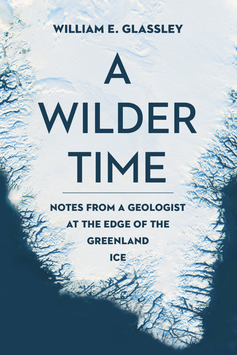“You didn’t come into this world. You came out of it, like a wave from the ocean. You are not a stranger here.” This Alan Watts quote prefaces William Glassley’s nonfiction book A Wilder Time. Watts was a 20th century Buddhist and spiritual lecturer who talked about the non-existence of self and the necessity of a return to nature in order to dissolve artificial, man-made divisions. Glassley, a geologist, takes his own Wattsian spiritual journey into the Greenland wilderness. Although Glassley’s scientific background comes across in his writing, it doesn’t outshine his poetic prose that captures the pristine, esoteric setting of an untouched land. Glassley and his colleagues, John and Kai, have a practical reason for being in Greenland; they want to obtain evidence that supports a widely-discarded theory purported by John and Kai in a previous research paper. This undercurrent of the book sets up the journey as one of redemption, with three researchers scouring an icy landscape to regain their standing in the scientific community. While this incorporation of tension adds narrative heft to the book, Glassley succeeds in his surgical-like precision of describing the revelatory aspects of an isolated experience in nature. Glassley portrays the lack of setting sun and the resulting inability to obtain a sense of time in an ethereal manner: “That inability to know time riddles the experience of place, dislocating perception into an insecurity that, in my case, made it seem as though I had trespassed into some other world.” Watts says we didn’t come into this world, but rather came out of it, and Glassley struggles with his own intrusion into the natural world, what we term wilderness. The juxtaposition between artificially-crafted existence, bound to ticking clocks and nine to fives, and that of the amorphous Greenland timeline strikes Glassley. In the context of the purpose for the journey—examining rocks and geological structures that stretch back eons--the emphasis on time is prevalent and jarringly prescient. “The biased patterns of thought I had inherited from another context were little more than low-level cosmic noise, a background hiss,” Glassley reports. “I had yet to grasp the magnitude of my ignorance.”  Glassley is an expert in his field, yet acknowledges the impenetrable nature of the world’s mechanisms. Thrust into Greenland, the baseline operating system for human life pales in comparison to the shifting glacial behemoths and wind-navigating falcons that punctuate Glassley’s landscape. The prose straddles the line effortlessly between poetic and scientific. We’re given an instance of collecting a sample set amidst the more significant, spiritual aspects of the activity: “That destructive act of collecting that small sample was, in a miniscule way, an act of liberation and creation, an unintentional and naive perturbation of the future.” Glassley’s ability to weave science into a compelling narrative is impressive. His propensity for beautiful prose that boils Greenland down into strikingly visceral snapshots is camera-like. What really pushes A Wilder Time into the upper echelons of nature books is its higher-reaching aims, using this location and journey to explore time, self, and the human relationship to nature for a meditative experience on what it’s like to live in a world where we have a boundary-creating term for the most fundamental aspects of our world: wilderness.
1 Comment
|
Archives
July 2024
Categories
All
|
|
Glassworks is a publication of Rowan University's Master of Arts in Writing 260 Victoria Street • Glassboro, New Jersey 08028 [email protected] |
All Content on this Site (c) 2024 Glassworks
|


 RSS Feed
RSS Feed
